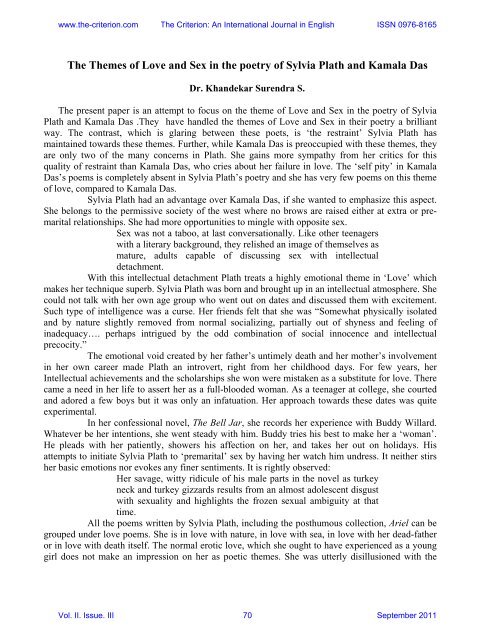Vol. II. Issue. III September 2011 - The Criterion: An International ...
Vol. II. Issue. III September 2011 - The Criterion: An International ...
Vol. II. Issue. III September 2011 - The Criterion: An International ...
You also want an ePaper? Increase the reach of your titles
YUMPU automatically turns print PDFs into web optimized ePapers that Google loves.
www.the-criterion.com <strong>The</strong> <strong>Criterion</strong>: <strong>An</strong> <strong>International</strong> Journal in English ISSN 0976-8165<br />
<strong>The</strong> <strong>The</strong>mes of Love and Sex in the poetry of Sylvia Plath and Kamala Das<br />
Dr. Khandekar Surendra S.<br />
<strong>The</strong> present paper is an attempt to focus on the theme of Love and Sex in the poetry of Sylvia<br />
Plath and Kamala Das .<strong>The</strong>y have handled the themes of Love and Sex in their poetry a brilliant<br />
way. <strong>The</strong> contrast, which is glaring between these poets, is ‘the restraint’ Sylvia Plath has<br />
maintained towards these themes. Further, while Kamala Das is preoccupied with these themes, they<br />
are only two of the many concerns in Plath. She gains more sympathy from her critics for this<br />
quality of restraint than Kamala Das, who cries about her failure in love. <strong>The</strong> ‘self pity’ in Kamala<br />
Das’s poems is completely absent in Sylvia Plath’s poetry and she has very few poems on this theme<br />
of love, compared to Kamala Das.<br />
Sylvia Plath had an advantage over Kamala Das, if she wanted to emphasize this aspect.<br />
She belongs to the permissive society of the west where no brows are raised either at extra or premarital<br />
relationships. She had more opportunities to mingle with opposite sex.<br />
Sex was not a taboo, at last conversationally. Like other teenagers<br />
with a literary background, they relished an image of themselves as<br />
mature, adults capable of discussing sex with intellectual<br />
detachment.<br />
With this intellectual detachment Plath treats a highly emotional theme in ‘Love’ which<br />
makes her technique superb. Sylvia Plath was born and brought up in an intellectual atmosphere. She<br />
could not talk with her own age group who went out on dates and discussed them with excitement.<br />
Such type of intelligence was a curse. Her friends felt that she was “Somewhat physically isolated<br />
and by nature slightly removed from normal socializing, partially out of shyness and feeling of<br />
inadequacy…. perhaps intrigued by the odd combination of social innocence and intellectual<br />
precocity.”<br />
<strong>The</strong> emotional void created by her father’s untimely death and her mother’s involvement<br />
in her own career made Plath an introvert, right from her childhood days. For few years, her<br />
Intellectual achievements and the scholarships she won were mistaken as a substitute for love. <strong>The</strong>re<br />
came a need in her life to assert her as a full-blooded woman. As a teenager at college, she courted<br />
and adored a few boys but it was only an infatuation. Her approach towards these dates was quite<br />
experimental.<br />
In her confessional novel, <strong>The</strong> Bell Jar, she records her experience with Buddy Willard.<br />
Whatever be her intentions, she went steady with him. Buddy tries his best to make her a ‘woman’.<br />
He pleads with her patiently, showers his affection on her, and takes her out on holidays. His<br />
attempts to initiate Sylvia Plath to ‘premarital’ sex by having her watch him undress. It neither stirs<br />
her basic emotions nor evokes any finer sentiments. It is rightly observed:<br />
Her savage, witty ridicule of his male parts in the novel as turkey<br />
neck and turkey gizzards results from an almost adolescent disgust<br />
with sexuality and highlights the frozen sexual ambiguity at that<br />
time.<br />
All the poems written by Sylvia Plath, including the posthumous collection, Ariel can be<br />
grouped under love poems. She is in love with nature, in love with sea, in love with her dead-father<br />
or in love with death itself. <strong>The</strong> normal erotic love, which she ought to have experienced as a young<br />
girl does not make an impression on her as poetic themes. She was utterly disillusioned with the<br />
<strong>Vol</strong>. <strong>II</strong>. <strong>Issue</strong>. <strong>II</strong>I 70 <strong>September</strong> <strong>2011</strong>
















